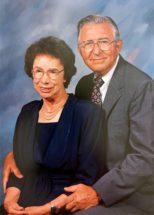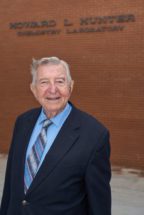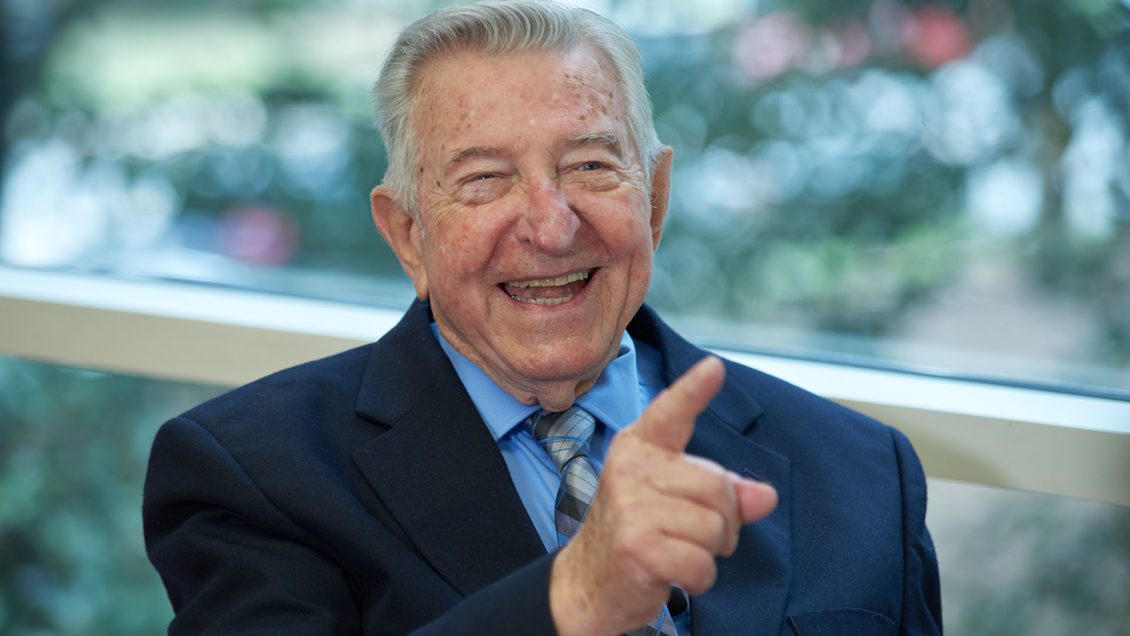Carl Bishop didn’t know he was applying to teach at his alma mater when he answered a short ad in Chemical & Engineering News for a teaching position at an unnamed small southeastern college.
“I had been applying for jobs in industry so I could get rich. I really had no intention of teaching at the time, but when I found out it was Clemson, like all Clemson men, I was headed home,” said Bishop, a native of Bamberg, South Carolina. Muriel Bishop, his wife of less than a year and a postdoctoral researcher in Yale University’s Department of Pharmacology at the time, received a job offer from Clemson, too.
“Ma” and “Pa,” as they affectionately became known in the Department of Chemistry, taught thousands of students during their Clemson careers that began in 1960 and spanned more than three decades.
Continuing to impact students
Today, they continue to impact Clemson chemistry students through the Dr. Carl B. Bishop ’54 & Dr. Muriel B. Bishop Scholarship Endowment. Bishop established the scholarship in memory of his wife, who taught at Clemson for 31 years and was the first tenured female chemistry professor at Clemson. She passed away in 2018. The scholarship provides undergraduate students majoring in chemistry tuition assistance.

“I wanted to honor my wife because she was that much to me,” said Bishop, who taught inorganic chemistry at Clemson for 32 years.
The Bishop scholarship means a lot to the students and the department.
Johnathan Phillips, who graduated in May with his bachelor’s degree in chemistry and wants to pursue a Ph.D. in nuclear chemistry, said receiving the scholarship boosted his confidence that he chose the right field.
“Going into chemistry, I was fairly nervous because I hadn’t taken certain classes that other people had in high school. I found that I really like it, but it’s hard to judge how you are at something, so receiving the scholarship helped bolster my confidence in what I had chosen,” he said.
Bill Pennington, chair of the Department of Chemistry, said the scholarship would help attract the best students to chemistry and Clemson.
“It’s such a wonderful thing. We’re very grateful. Certainly, ‘Ma’ and ‘Pa’ have done their duty in teaching so many people chemistry, but it’s wonderful that they’re going to continue that work through the scholarship,” Pennington said.
Good decision
Carl Bishop hadn’t given much thought to attending graduate school until about a week before graduating with his bachelor’s degree. A member of the chemistry department suggested he continue his education at Michigan State University. Bishop replied that he would have to check with his parents first.
“They said they had already spent their money on my older sister and me but would see if they could buy me some warm clothes and swap cars with me,” he said.
He went to his first orientation, and Muriel Boyd, a biochemistry student from Montgomery, Alabama, sat three rows behind him.
“She said she heard my Southern accent. She only saw the back of my head, but she said, ‘I think I’ll marry him,’” Bishop recalled.
Although their desks were near each other, it took him about a month to talk to her. Soon they started dating.
After Muriel received her Ph.D. in biochemistry, she accepted a one-year postdoctoral position at Yale University. One of the professors was doing polio research and had some glass she couldn’t get the monkey kidney cells to grow on properly.
Muriel told the professor she knew somebody who was finishing his degree in inorganic chemistry who could probably help, referring to Carl. The professor called Carl and asked if he’d be willing to come to Yale and spend the time he had left before he went on active military duty.
The proposal
Carl decided it was time to ask Muriel to marry him.
He borrowed a tape recorder, put on some romantic-sounding music in the background and recorded a five-minute proposal. He mailed the tape and a diamond engagement ring to Muriel.
“I proposed with an audio tape my intention to be honorable,” he said.

She had to rent a tape player to listen to Bishop’s message. At the end of the tape, she recorded her answer. “Yes, I will marry you,” she said.
They got married in Muriel’s hometown a few months later.
“It was one of those high-speed marriages,” Carl Bishop said. “We drove from New Haven to Montgomery. We got off work on Thursday afternoon, married over the weekend and were back at work Tuesday morning.”
After getting married, they lived in Muriel Bishop’s small one-room apartment, so small they could sit on the bed and eat off the only table they had.
“It was a good place to start a marriage,” he said. “We didn’t know anybody. We were together. If you wanted to argue, it was only with each other. It’s a good way to get to know each other,” he said.
At Yale, they worked across the hall from each other. They moved to Anniston, Alabama, when Carl Bishop was on active military duty, and then moved to Clemson, where they lived in University housing and shared an office for their first five years on the faculty.
Inseparable
“Being separated was almost unknown. We were always together,” Carl Bishop said. “About the only time we weren’t together was when she was teaching or I was teaching.”
While at Clemson, Muriel developed a medical technology program and directed it for nearly 25 years. The Bishops wrote a laboratory manual for freshman chemistry while on sabbatical leave at the University of Georgia. The manual has continued through five editions.
Muriel Bishop received her Bachelor of Science degree in chemistry from Huntingdon College in Alabama and a Master of Science in biochemistry from Emory University. Carl Bishop graduated from Clemson in 1954 with a degree in chemistry. He earned his Ph.D. from Michigan State.
The Bishops were married for 59 years. They have one daughter, Kathryn Bishop Setzer ’83. Kathryn and her husband Randall have one son, Zachary ‘14, and one daughter, Shannon ‘17.
The College of Science pursues excellence in scientific discovery, learning, and engagement that is both locally relevant and globally impactful. The life, physical and mathematical sciences converge to tackle some of tomorrow’s scientific challenges, and our faculty are preparing the next generation of leading scientists. The College of Science offers high-impact transformational experiences such as research, internships and study abroad to help prepare our graduates for top industries, graduate programs and health professions. clemson.edu/science
Get in touch and we will connect you with the author or another expert.
Or email us at news@clemson.edu

